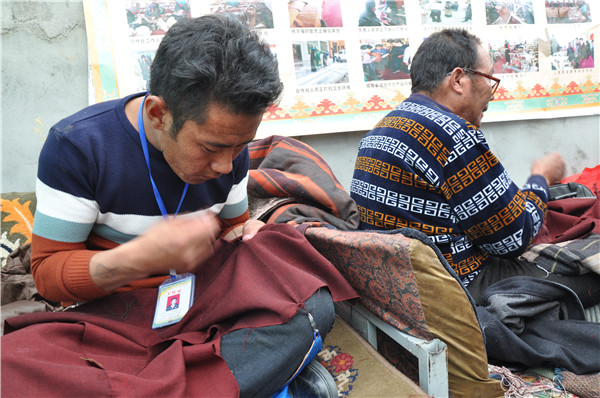Woolen comfort
Namdrol, a local resident, started learning the craft from her mother as a teenager.
In 2013, she established a workshop near her home by organizing local women and others who couldn't go out to work in faraway places.
With support from the town's government-providing low-interest loans and training local farmers for the work-the workshop, located not far from the banks of the Yarlung Zangbo River that runs through the town, has since grown into a cooperative of about 80 members.
Namdrol's daily work includes training apprentices. Among her 30 apprentices, 23 have mastered the techniques, she says.
Nyima Pyingtsuo, 29, has been stitching at the cooperative for three years.
His wife also works there. Earlier, he used to be a plumber and had to look for work in distant areas.
"It used to be tiring and dirty work, and it was hard to find work during winter," he says. "Now my work is more relaxed and cleaner. I can work all year round."
Together with some other workers, he was trained to stitch at the cooperative.
Today, Nyima Pyingtsuo works nine hours a day, and can piece together about 4 square meters of fabric in one sitting.
On average, he earns 130 yuan a day. His family members grow highland barely at home, and he takes a month off during the farming season to give them a hand, he says.
"I will keep doing my work at the cooperative," he says, adding that he wishes to buy a car this year.
Each worker at the cooperative received a refrigerator and a washing machine as bonuses during the Tibetan New Year in February.
Nyima Pyingtsuo says more young people like him are willing to take on such craft work as they can earn more money than before.
Besides attracting the young, the cooperative has also benefitted people, including the elderly and disabled people, who have less access to other jobs.
Gesang, 56, has been working at the cooperative since it was founded. Although she had learned to weave as a child, she still needed extra training to make quality woolen products.
"I used to weave at home, but only to make plain clothes for my own family and not for sale," she says. "I couldn't imagine that I could earn money this way."
In the past, the only sources of income for her family were growing highland barely on a small plot of land and her son's salary as a migrant worker in a city, says Gesang.
Now she is the highest earner in her family. Her daughter-in-law also works part time at the cooperative during the slack season.























